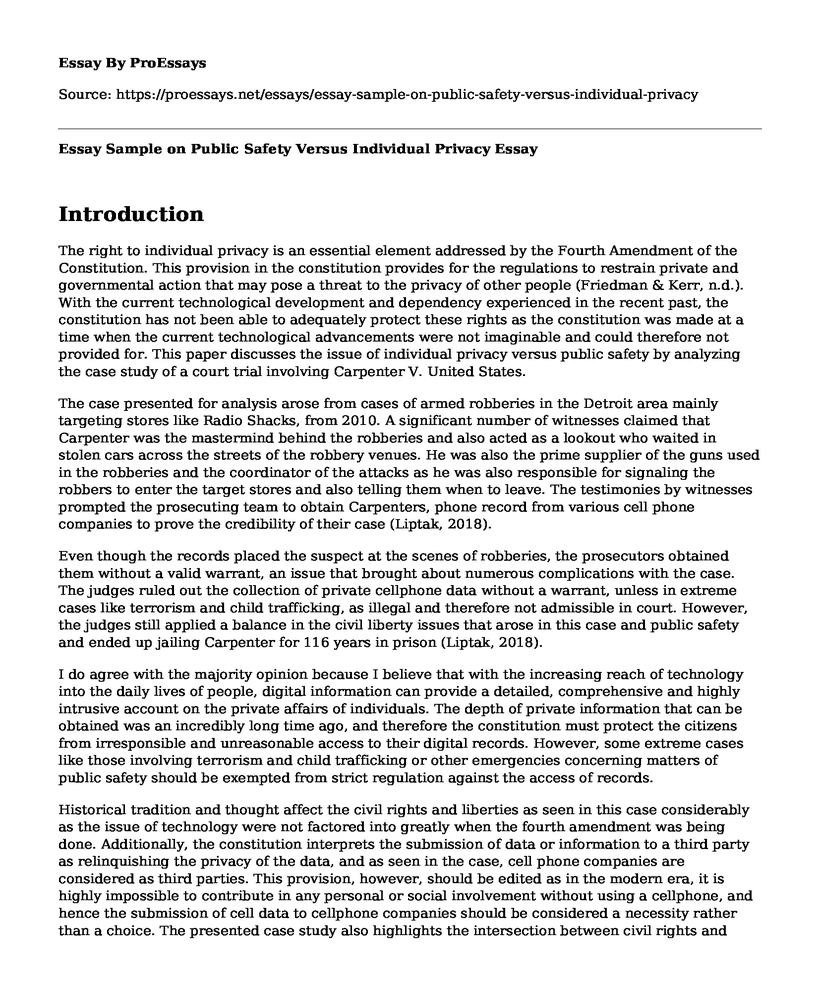Introduction
The right to individual privacy is an essential element addressed by the Fourth Amendment of the Constitution. This provision in the constitution provides for the regulations to restrain private and governmental action that may pose a threat to the privacy of other people (Friedman & Kerr, n.d.). With the current technological development and dependency experienced in the recent past, the constitution has not been able to adequately protect these rights as the constitution was made at a time when the current technological advancements were not imaginable and could therefore not provided for. This paper discusses the issue of individual privacy versus public safety by analyzing the case study of a court trial involving Carpenter V. United States.
The case presented for analysis arose from cases of armed robberies in the Detroit area mainly targeting stores like Radio Shacks, from 2010. A significant number of witnesses claimed that Carpenter was the mastermind behind the robberies and also acted as a lookout who waited in stolen cars across the streets of the robbery venues. He was also the prime supplier of the guns used in the robberies and the coordinator of the attacks as he was also responsible for signaling the robbers to enter the target stores and also telling them when to leave. The testimonies by witnesses prompted the prosecuting team to obtain Carpenters, phone record from various cell phone companies to prove the credibility of their case (Liptak, 2018).
Even though the records placed the suspect at the scenes of robberies, the prosecutors obtained them without a valid warrant, an issue that brought about numerous complications with the case. The judges ruled out the collection of private cellphone data without a warrant, unless in extreme cases like terrorism and child trafficking, as illegal and therefore not admissible in court. However, the judges still applied a balance in the civil liberty issues that arose in this case and public safety and ended up jailing Carpenter for 116 years in prison (Liptak, 2018).
I do agree with the majority opinion because I believe that with the increasing reach of technology into the daily lives of people, digital information can provide a detailed, comprehensive and highly intrusive account on the private affairs of individuals. The depth of private information that can be obtained was an incredibly long time ago, and therefore the constitution must protect the citizens from irresponsible and unreasonable access to their digital records. However, some extreme cases like those involving terrorism and child trafficking or other emergencies concerning matters of public safety should be exempted from strict regulation against the access of records.
Historical tradition and thought affect the civil rights and liberties as seen in this case considerably as the issue of technology were not factored into greatly when the fourth amendment was being done. Additionally, the constitution interprets the submission of data or information to a third party as relinquishing the privacy of the data, and as seen in the case, cell phone companies are considered as third parties. This provision, however, should be edited as in the modern era, it is highly impossible to contribute in any personal or social involvement without using a cellphone, and hence the submission of cell data to cellphone companies should be considered a necessity rather than a choice. The presented case study also highlights the intersection between civil rights and politics, as it is political leaders who have the ultimate responsibility of passing laws for example regarding the effect of technology and individual privacy to enable the courts to rule on such cases more effectively.
Conclusion
A recommendation on the consequences that should be suffered by those who engage in or directly contribute to the violation of constitutional rights should be the payment of fines and compensation to those affected by their violations. The individuals whose rights have been violated by others should be compensated for any loss incurred by the affected party whether financially, emotionally, or in terms of spoilt reputation.
References
Friedman, B. & Kerr, O. (n.d.). The Fourth Amendment. Retrieved from https://constitutioncenter.org/interactive-constitution/amendments/amendment-iv
Liptak, A. (2018). In Ruling on Cellphone Location Data, Supreme Court Makes Statement on Digital Privacy. Retrieved from https://www.nytimes.com/2018/06/22/us/politics/supreme-court-warrants-cell-phone-privacy.html
Cite this page
Essay Sample on Public Safety Versus Individual Privacy. (2022, Dec 22). Retrieved from https://proessays.net/essays/essay-sample-on-public-safety-versus-individual-privacy
If you are the original author of this essay and no longer wish to have it published on the ProEssays website, please click below to request its removal:
- Essay on the 13th (2016) Documentary: Revelation of a High Number of Black Americans in Prison
- Is Organized Crime Evolving into a Conventional Business Model Style of Operations?
- The Color of Justice - Essay Sample
- Research Paper on Social Democracy
- Is It Misleading to Label a Crime as "Victimless" Essay
- Ron D. Meyer v. Race City Classics Paper Example
- Corrections: Last Step in Criminal Justice System - Essay Sample







